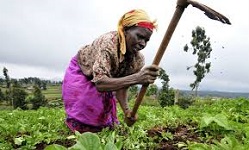The African Risk Capacity Limited (ARC Ltd) and Pula partner to deliver best-in-class agriculture index insurance products to protect African farmers from climatic risks.
Every farming season, African farmers are exposed to a wide range of climate risks including drought, excessive rainfall, pests and diseases, and several other perils that negatively affect their yields. ARC is the commercial subsidiary of African Risk Capacity Group (ARC Group). As an aggregator specialising in meso and micro parametric insurance in agriculture, Pula provides the levers to connect participating farmers with regional insurance companies and global reinsurance firms to underwrite such risks, according to the press statement from ARC.
Under its inclusive growth strategy, ARC Ltd is currently diversifying its risk portfolio to non-sovereign risks, in addition to exploring partnerships with private and public sector players, to deliver holistic disaster risk financing mechanisms.
Commenting on the goal of the partnership, the CEO, ARC Ltd, Lesley Ndlovu indicated that a formal collaboration relationship with Pula is necessary to help achieve the mission to promote harmonised resilience solutions for protecting African lives and livelihoods vulnerable to natural disasters. “The ARC Group is currently expanding its product offerings to African Member States; and by experience, we have seen that there will always be farmers whose Governments may, by reason of fiscal constraints, not be able to take up an umbrella Sovereign disaster risk policy. Working with Pula will enable us to extend coverage to Member States and these farmers in a timely and targeted manner on a mutually adaptable basis.”
The partnership will run for an initial period of 3 years and will enable Pula to work closely with ARC Group in the areas of product development, marketing, premium collection and claims disbursements among others. Also, Pula’s strong capacity in Area Yield Index, for example, will complement ARC Ltd’s strength in drought covers; just as the existing good relationships between Pula and farmers and other aggregators will benefit from ARC Ltd’s tested relationships with African governments and industry regulators.
“ARC Limited is the first of its kind in sovereign disaster risk insurance in Africa”, said Thomas Njeru, the Founder and Co-CEO of Pula. “The development insurance approach of the ARC Group resonates with our mission to provide an end-to-end management of the delivery of insurance to farmers, including field operations, farmer onboarding, education and claims assessment and payouts. We envisage a win-win partnership that will leverage our best-in-class index insurance products and technology with ARC’s strong partnerships with Governments to provide ground-breaking products to farmers. In partnering with ARC we expect that we can push the boundaries of product performance to our customers and radically increase the access to insurance for millions of farmers across Africa, giving them access to the tools they need to become resilient in these challenging times”, he added.
In just over 6 years of operations, 56 policies have been signed by the ARC Member States with USD 83 million paid in premiums for cumulative insurance coverage of USD 641 million and the protection of 64.1 million vulnerable population in participating countries. From this, ARC Ltd made $60m payouts to the Governments of Senegal, Niger, Mauritania, Malawi, Cote D’Ivoire, the START Network and WFP following droughts episodes in 2014, 2015 and 2019. These funds have gone towards assisting over 2.5 million people whose livelihoods rely on agriculture, preventing the loss of hard-earned developmental gains in addition to 1m.
Governments have used ARC Ltd insurance payouts to scale up cash transfers, subsidize livestock feeds, replenish depleted food reserves, and distribute emergency food supplies. Recently, in 2020, payouts of USD 2,13 million were made to the Republic of Madagascar to cover 600,000 vulnerable population; and $1.8m to the Government of Zimbabwe and WFP to support over 500,000 people affected by the drought.

